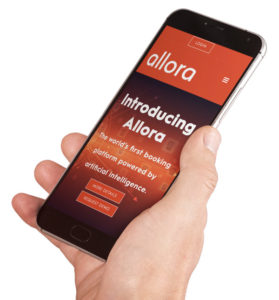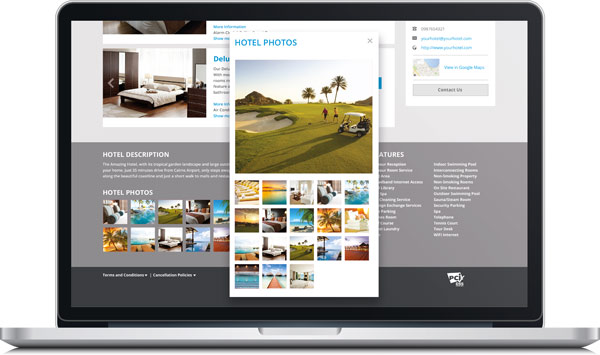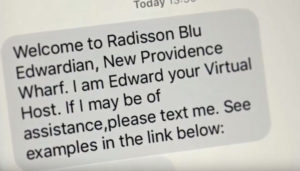For many people, artificial intelligence (AI) conjures up an image of scary humanoid robots taking over the world. But for a growing number of hoteliers, AI's increasing sophistication and ability to crunch through huge amounts of data, learning as it goes, is not so much scary as game-changing.
For example, 24-7 concierge chatbots have the capacity to absorb and give out more information that any human, and AI-powered booking engines and business performance technologies can drive more direct bookings and repeat customers at a lower cost.
A personalised approach One of the big realisations the hotel industry has had over the past few months is that AI can allow operators to get much more personalised in their approach. Take Avvio's AI-powered booking engine, Allora, which launched in October. It works on machine learning, which means it can crunch large volumes of data and understand where people are coming from and what kind of rates are most suitable.
"For example, if you have an IP address from the US, Allora will present all rates in US dollars and will know that people who have come through the engine from the US before might prefer to see rates in a certain way," explains Ian Sloan, Avvio's vice-president of client strategy. "It will personalise the experience for the type of booker."
Hoteliers can also benefit from what Avvio calls network intelligence. This goes beyond individual hotels and anonymises the data at a much higher level (for hundreds of hotels), meaning it can work out the booking patterns of different types of bookers from across the Avvio network. "The more people we can get on board, the more the data we have, and we can make everything so much more contextual and relevant for everyone," Sloan says.
Identifying "good' guests
Another new entrant into the hotel technology market is Noetic, a piece of technology that acts as the "intervention layer' between a hotel's website and its property management system (PMS). It takes all the useful information from the website and pushes what's required into the PMS, while shaping it in ways that are conducive to better marketing. In other words, it crunches all the data to determine what a "good' guest looks like – generally one who is cheap to acquire and spends a lot of money over their lifetime – and works out how to keep them while reducing hoteliers' reliance on online travel agents (OTAs).
"The data and intervention layer that we have indicates very quickly what looks like a potential best guest. Then it's about focusing on how to best take ownership of the relationship and build that up," explains Stephen Barr, chief data scientist and managing partner at Noetic.
He adds that – without exception – hoteliers have been shocked at what Noetic has found. "Even when they have a really good feel for the business, they're surprised what a small percentage of guests are responsible for a large percentage of revenue."
Integrations are the way forward
For James Bishop, vice-president of sales for EMEA at hotel booking and distribution technology provider Siteminder, integrations such as Noetic's are the way forward for the sector. The technology can link up not only with Siteminder itself, but almost any software that has an API, from email marketing to helpdesk solutions.
"Already, we're seeing more and more hotel technology providers working closely together for the hospitality industry to provide better and more integrated technology solutions, so hotels can not only increase their online presence, but understand where their bookings are coming from and how they got there," he says.
Integrations are also critical to ensure the booking process is as smooth as possible while engaging customers enough to encourage feedback. "Technology can play a pivotal role in supporting operators to remove the friction throughout the booking process – or, "unbreak the fragmentation', as we say," Bishop says. "It's about hoteliers using automation to their advantage, so they can step away from manually managing each booking and instead spend that time with guests."
Of course, while hoteliers have the opportunity to influence the feedback process through the experience they create, clever integrations can also help by engaging guests at optimal times during their journey.
Booking systems that integrate with social media sites, for example, can encourage guests to share their booking through the platform once it's complete, while platforms like TripAdvisor Review Express send automatic emails to guests, prompting them to review their stay and experience.
Are chatbots the future?
Although mobile responsive websites and booking systems have become an expectation for travellers over the last 12 months, apps are on the opposite trajectory. "We are seeing a stagnation of app downloads," says Mark McSpadden, vice-president of digital experience at travel technology giant Sabre. Indeed, the majority of US consumers download zero apps per month, according to comScore.
That said, the apps we already have – most notably messaging platforms, which from the end of 2015 started overtaking social media apps as the number one thing people spend time on when they're on the mobile devices – are something hoteliers can't afford to ignore. "These messaging platforms are where people are spending time, so the question is how do hoteliers engage customers on those platforms?" McSpadden asks.
The answer, increasingly, seems to be chatbots. And while the consensus is that they won't become an expectation for bookers for another couple of years, there will undoubtedly be movement in this space in the next 12 months.
"If you look back to when we were bringing on desktop web and mobile, these platforms were very informational for their first several years. Then, when people started spending enough time on them, and feeling comfortable getting information on them, they started to transact on those platforms," McSpadden says. "I think we'll see something similar with messaging bots."
The interesting part for McSpadden will come when bots do eventually move to transactions. "On both web and mobile, hoteliers are up against an OTA, and those OTAs are based on lists and long pages of options, which don't work in a chatbot interface," he explains. "So what you'll see is much more curated results, and I actually think that favours the direct channel, so I think the exploration there is really positive for hotels."
In the meantime, straightforward chatbot interfaces are being used by more and more hoteliers to answer basic FAQs for guests. The benefits? Engaging guests where they are, increasing the efficiency of conversations, and building a library of data on the sort of requests that come in. The keys to success? Keeping them specific and making sure you're clear about the bot's intention and positioning.
As for apps, they're not quite on their way out yet. On top of messaging apps, loyalty-focused solutions – eliminating the need for customers to carry cumbersome loyalty cards – which may have booking or other capabilities as a secondary focus, remain particularly popular.
As ever, the biggest focus for hoteliers who are thinking about upgrading their booking system should be the customer experience. "Everything should flow backwards from that," Sloan advises. "It's also super important that, if people are prepared to share their data and their details with you, that you keep your end of the promise, do something useful with it and give them the best user experience possible."
And as Barr is keen to add, the future of the industry is not entirely in technology. "Most people in a hotel most of the time just want to have their expectations met. Despite the fact that someone like me spends most of his time mired in data, it all stops working incredibly quickly if the experience isn't what the guest has been promised."
Bots behind the scenes in restaurant booking Artificial Intelligence also has a huge amount of potential in the restaurant industry, particularly when the algorithm has a large amount of data from electronic point of sale (EPoS) and reservations systems to work with. And, looking ahead, it's likely it will also be used to identify trends and predict future behaviours.
One of the areas Resdiary chief executive Mike Conyers sees this happening is in the management of no-shows. "With the correct data, machine learning could answer questions like: are guests who make a booking at 4am less likely to turn up than guests who book at 4pm? Do Saturday reservations have a higher no-show rate than Sundays? This will allow operators to take precautions against high-risk diners, safeguarding their revenues," he says.
In the meantime, lower-tech systems can also be used to handle the human factor, particularly one of restaurant's biggest frustrations – when too many people turn up and some of them have to be turned away.
Recently launched Second Guest, for example, is an SMS-based system restaurants can use to page walk-in customers when a table becomes free. The host captures the guest's name and number along with any special requests and they are then free to spend their wait time as they please. As soon as they return, the guest is handed over to the restaurant's EPoS system. Larger groups can also share their waiting lists via the system.
When it comes to chatbots, it's a similar story for restaurants as it is for hotels: guests are still wary of using them for transactions, but are happy to use them for simple tasks or to get answers to simple questions.
The key, according to Eloise Sheppard, managing director of Call Systems Technology (CST), is to ensure a chatbot can integrate across existing technologies. "The technological sweet spot is enquiries that are handled by a bot, with bookings then linked instantly to front-of-house," she says.
There is also potential for bots behind the scenes. "They can carry out a whole bunch of repetitive tasks with one instruction," says Roland Butler, product director at Bookatable by Michelin. "This lets a restaurateur spend more time with diners and their staff and less time trying to manage their restaurant through a computer."
Overall, restaurateurs must stop thinking of technology in silos and take a holistic, integrated approach, stresses liveRES managing director Olivia FitzGerald. "Integrated technology has been the key driver in 2017. We have seen a significant sea change from operators seeking to invest in reservation systems that integrate with EPoS, as table availability and turn management, staffing, stock availability, pricing, offers and order processing are all managed within the EPoS universe.
"Ultimately, operators recognise that integration is about creating a seamless customer journey, from booking a table to settling a bill, as happy customers drive loyalty, sales and profits."
Meet Edward, Edwardian Hotel group's virtual concierge He's been asked out on dates, had envelopes of cash delivered to him at the front desk and even received an offer of marriage. Although he gets mistaken for a human concierge, Edward is a computer programme, albeit one that has completely transformed operations at the Edwardian Hotels group since he – or should that be it? – was launched a year and a half ago.
Originally, Edward could only deal with 60 topics, but thanks to assisted machine learning he's now up to more than 1,600. "If he doesn't know the answer, Edward asks for assistance from various staff members and then evaluates the answer," explains Edwardian's director of information technology Michael Mrini. "If the answer comes from the general manager, he'll take it as correct, but if it's a new member of staff, he'll ask for a second opinion."
Edward can answer the same question in a variety of ways and understands phrases that a more straightforward bot might not be able to decipher, like "not too bad".
"The most difficult parts to build were when Edward needs to identify the intent and the mood," Mrini recalls.
The key to success with any bot, for Mrini, is that it connects to all systems in the hotel. "Without data, a chatbot is absolutely useless," he explains. "Edward is connected to all our databases, from the booking system to HR."
Since Edward was introduced, efficiency has improved. For example, the group now gets 60% fewer phone calls requesting information, but more importantly he's enabled the team to learn much more about their guests.
"We've discovered that most of our guests don't know whether breakfast is included in their booking, and that the last thing people think about before they go to bed is breakfast," Mrini says.
The beauty of the system is that the more interactions Edward has with guests, the more he learns and the more information the hotel has to play with. Patterns that have been identified have also meant that the hotel has been able to upsell in a way that matches guests' needs.
"It's a more intelligent way of informing the guests of what is possible, but in the meantime, it's good for our revenues because we give them something that they want at the right price," Mrini explains.
In fact, the staff have come to see Edward as a member of the team. "Now, if you ask somebody a question, they say, 'Oh I don't know, ask Edward,'" he smiles.
Continue reading
You need to create an account to read this article. It's free and only requires a few basic details.
Already subscribed? Log In












